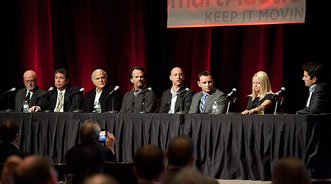Though Volumes Are Low, the Industry Is Embracing Change and Looking to Future with Excitement

By subscribing, you agree to receive communications from Auto Remarketing and our partners in accordance with our Privacy Policy. We may share your information with select partners and sponsors who may contact you about their products and services. You may unsubscribe at any time.
LAS VEGAS –
Though the low auction volumes and economic backdrop certainly played a big role in the discussions at the National Remarketing Conference, the larger picture taking shape at this year’s event is an industry that is stronger, more nimble and tackling the challenges with enthusiasm and creativity.
A clear example of this is the Executive Suite Thursday afternoon. This panel featured Bob Rauschenberg, of ADESA; Pierre Pons, of ServNet; Mike Hockett, of ABC; Nick Peluso, of Manheim; Steve Kapusta, of Ally’s SmartAuction; Dave Blake, of Auto Auction of New England; Kristie Griffin, of Milwaukee Auto Auction; and Peter Kelly, of OPENLANE.
Kicking off the discussion, Rauschenberg explained that ADESA made some changes a few years ago, including ramping up the focus on dealer consignments. This has helped keep auction volumes from dropping as much, and he even noted that some segments are growing.
Over at Manheim, Peluso said the company is preparing itself for the future. Though some auctions have been consolidated, he stressed that the number of sales has not changed. Some of the sales were just shifted to a different facility.
Moreover, he said Manheim is ramping up its investment in technology even more.
As for OPENLANE, which was recently acquired by KAR Auction Services — ADESA’s parent company — Kelly said the team has a very full agenda of integration activities. Since the company serves more commercial consignors, there has been some downswing in volume.
Subscribe to Auto Remarketing to stay informed and stay ahead.
By subscribing, you agree to receive communications from Auto Remarketing and our partners in accordance with our Privacy Policy. We may share your information with select partners and sponsors who may contact you about their products and services. You may unsubscribe at any time.
According to Pons, ServNet has opened some greenfield locations and the group’s auctions are well capitalized and going strong.
As for Auction Broadcasting Co., much of its volumes include dealer consignments, and Hockett highlighted these are up more than 20 percent.
Griffin, of Milwaukee Auto Auction, said her facility has really ramped up on technology. Any idea the auction team develops for its institutional consignors is also implemented for dealer consignors, she pointed out. This has really been positively received, she indicated.
Blake, of Auto Auction of New England, said that the benefit of independent auctions is that the decision makers can generally move more quickly to change.
In fact, he said, “Independents are doing a great job implementing technology.”
Technology also came up when Kapusta spoke. Talking about the industry in general, he said, “If you don’t have a plan for mobile, you will be behind.”
But he also acknowledged it can be difficult to keep up with something that changes seemingly overnight almost.
In essence, the executives all seemed to share a tone of enthusiasm and excitement, as well as a focus on the future. They are preparing for when volumes come back. And when might this be? According to some accounts, there could be a bit of an upswing in the second half of next year, while others appear to be focusing on 2013 as the year when volumes could start to return.
“They (dealers) have adapted. On the Ally side volumes are low. In 2013 volumes will start to ramp back up,” Kapusta explained.
Blake chimed in, adding, “We’re not talking doom and gloom here. There is excitement.”
Peluso said, “We think 2012 will be a good year.”
As for Hockett, he said “good competition is good for the industry. We’re going to work through these difficult times.”
Concluding the discussion, Rauschenberg declared that there is no better venue to sell things than through auctions.
“What a wonderful industry,” he said.


